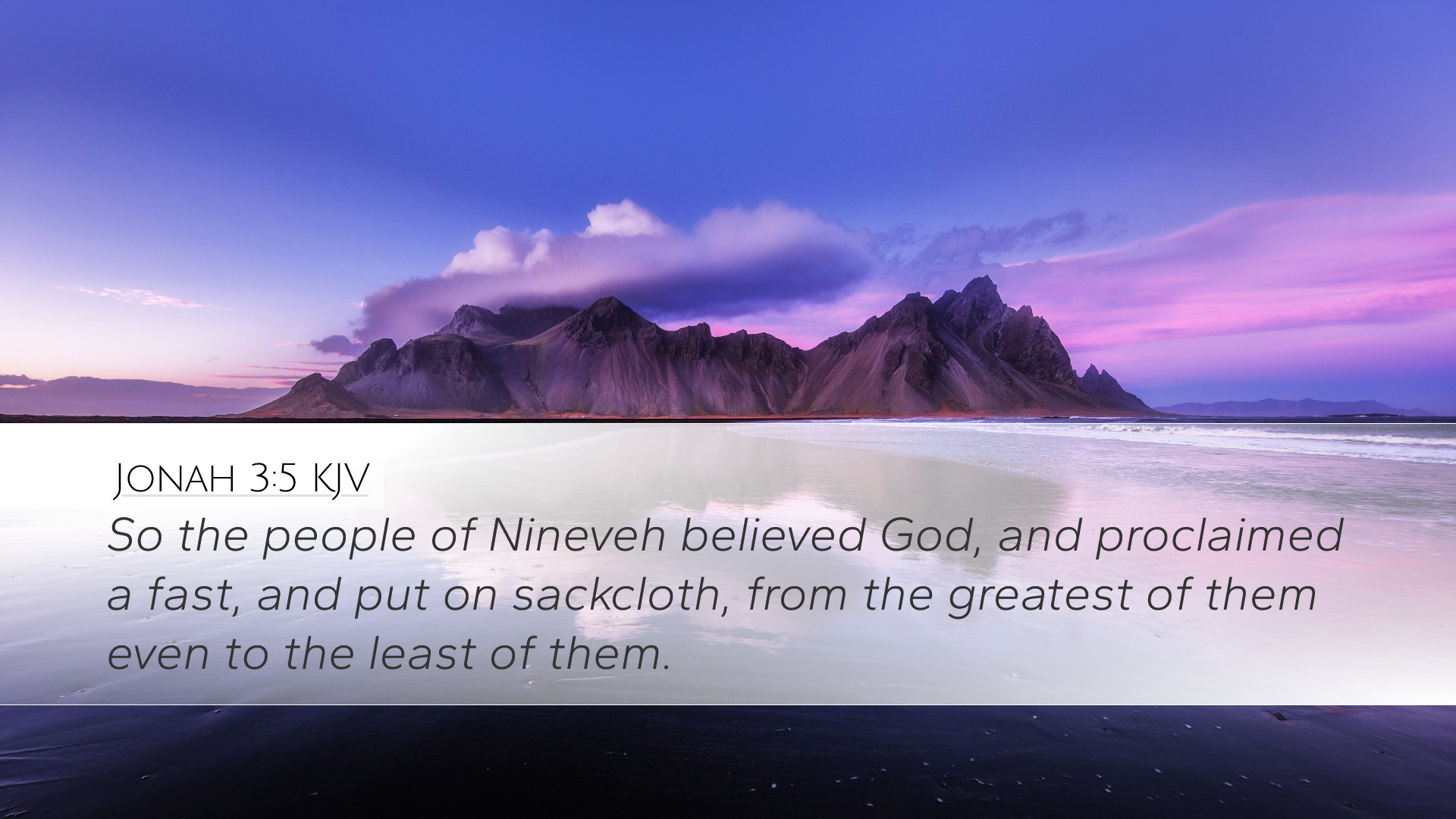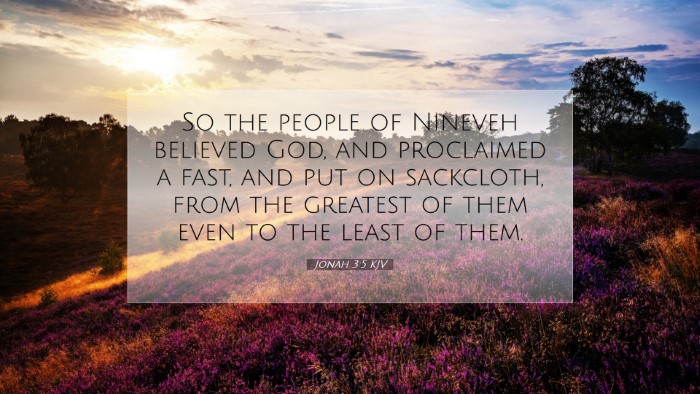Old Testament
Genesis Exodus Leviticus Numbers Deuteronomy Joshua Judges Ruth 1 Samuel 2 Samuel 1 Kings 2 Kings 1 Chronicles 2 Chronicles Ezra Nehemiah Esther Job Psalms Proverbs Ecclesiastes Song of Solomon Isaiah Jeremiah Lamentations Ezekiel Daniel Hosea Joel Amos Obadiah Jonah Micah Nahum Habakkuk Zephaniah Haggai Zechariah MalachiJonah 3:5
Jonah 3:5 KJV
So the people of Nineveh believed God, and proclaimed a fast, and put on sackcloth, from the greatest of them even to the least of them.
Jonah 3:5 Bible Commentary
Commentary on Jonah 3:5
Bible Verse: "So the people of Nineveh believed God, proclaimed a fast, and put on sackcloth, from the greatest to the least of them." (Jonah 3:5)
Introduction
The verse serves as a pivotal moment in the narrative of Jonah, revealing the power of God's word and the introspective response of the Ninevites. This commentary synthesizes insights from public domain sources to explore the theological significance and practical implications of this verse.
The Response of Nineveh
In Jonah 3:5, we witness a remarkable transformation among the people of Nineveh. The spontaneous belief in God led to a collective act of repentance. Various commentators highlight several dimensions of this response:
- Faith in the Word of God: Matthew Henry emphasizes that the people of Nineveh believed “God,” indicating their recognition of divine authority. This belief was not merely intellectual but resulted in immediate action, signifying genuine faith.
- Proclamation of a Fast: Adam Clarke notes that fasting was a common biblical practice of mourning and repentance. The Ninevites’ decision to fast publicly underscores the seriousness with which they approached their sinfulness.
- Sackcloth as a Sign of Mourning: The mention of sackcloth symbolizes humility and sorrow. Albert Barnes illustrates this practice as an ancient expression of grief and repentance, indicating that even the highest in society participated in this act.
- Inclusivity of Repentance: The phrase “from the greatest to the least” stresses that the call to repentance encompassed all strata of society. This democratization of faith reveals God’s universal call for repentance and the accessibility of His grace.
Theological Implications
This verse encapsulates several theological dimensions vital for pastors and theologians:
- The Power of God's Word: The effectiveness of Jonah's preaching illustrates that the proclamation of God's message can lead to life-changing responses. The contrast between Jonah’s reluctance and the Ninevites’ immediate acceptance invites reflection on resistance to God’s call.
- Repentance and Forgiveness: The actions of the Ninevites serve as a paradigm of repentance. Their heartfelt recognition of sin was met with God's readiness to forgive, showcasing the theme of redemption that runs through Scripture.
- Divine Patience and Sovereignty: This passage also reveals God's sovereignty in using a reluctant prophet to accomplish His purposes. Jonah's mission was fulfilled not through his own volition, but rather through God’s extraordinary grace and mechanism.
Practical Applications for Ministry
The narrative produces several takeaways that can guide contemporary ministry:
- Call to Holistic Repentance: Churches are encouraged to foster an environment where congregants can collectively recognize their shortcomings. Fasting and prayer should be integrated into communal worship as expressions of sincerity and humility before God.
- Inclusivity in the Gospel Message: As the Ninevites demonstrated a collective response to God, ministries should emphasize an inclusive approach in reaching diverse populations, reinforcing that the Gospel message transcends social and economic boundaries.
- Encouragement in Sharing the Word: Modern believers should take heart from Jonah's experience, understanding that successful proclamation does not depend on a perfect messenger but on the power of God’s Word to reach hearts.
Conclusion
Jonah 3:5 serves as a powerful narrative of belief, repentance, and God’s transformative grace. The powerful outcome of Jonah’s reluctant obedience reveals truths about faith, divine mercy, and the hope that repentance brings. As we study this verse, we are reminded of the profound impact faith can have, not only on individuals but also on entire communities.


